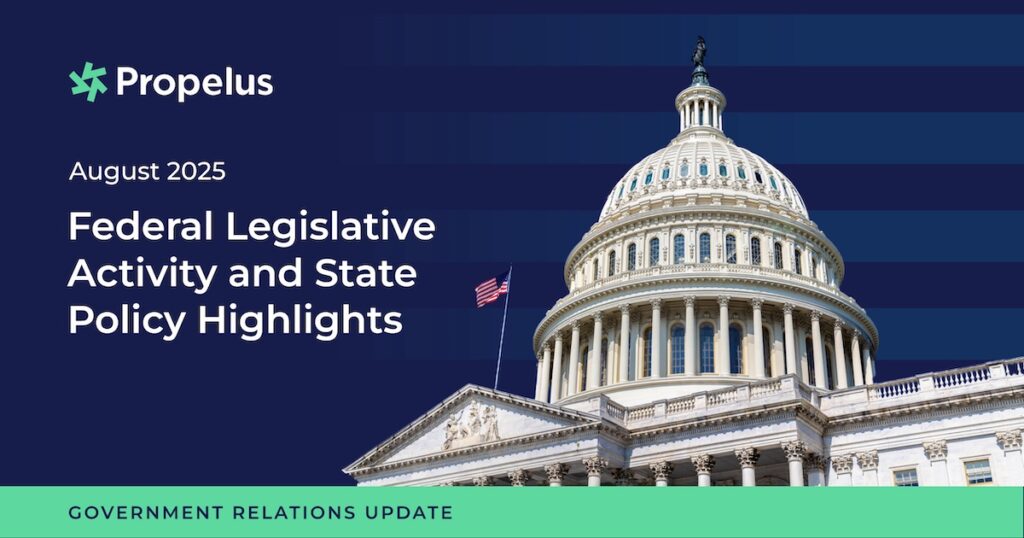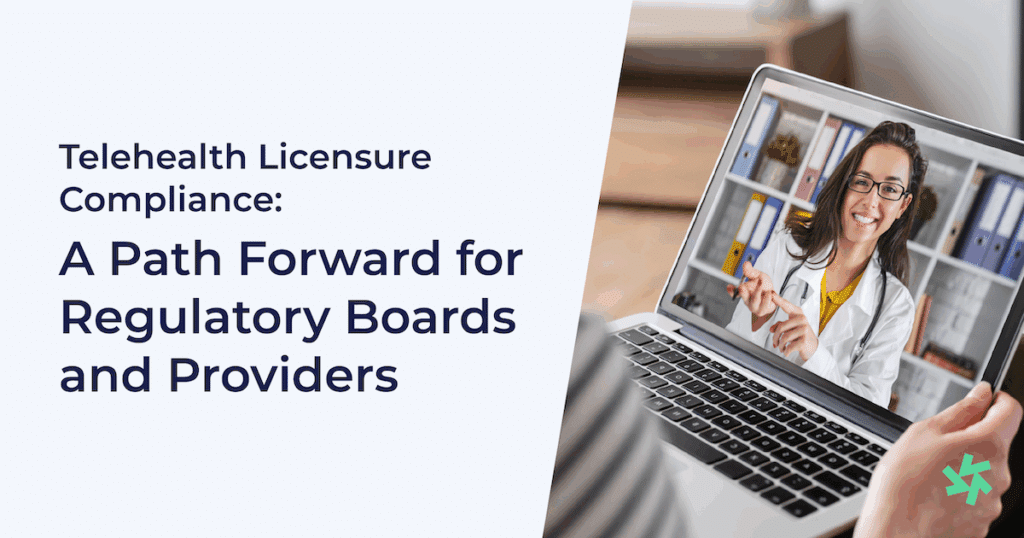August Government Relations Update: Federal Legislative Activity and State Policy Highlights

By Kelly Parker, Vice President of External Affairs and Government Relations, Propelus Welcome to our August Government Relations Update! This month, we’re diving into the latest federal legislative actions and significant state policy developments impacting healthcare. From telehealth to rural hospital support and the ever-evolving landscape of professional licensure, here’s a rundown of the key updates you need to know. Federal Updates Telehealth: The CONNECT for Health Act of 2025 Good news for telehealth! Representative Mike Thompson (D-CA) recently introduced the bipartisan CONNECT for Health Act of 2025 (H.R. 4206). This bill aims to permanently extend the telehealth flexibilities that proved so vital during the COVID-19 public health emergency. Without action, these provisions are set to expire on September 30, 2025. Key provisions in the bill that will impact healthcare systems and providers include: Permanent Removal of Geographic Restrictions (§101): This means patients can access telehealth services from anywhere, no longer limited to rural or underserved areas. Expanded Telehealth Provider Eligibility (§103): Access to care is broadened by allowing a wider range of healthcare professionals to deliver telehealth services. Permanent Telehealth Authorization for FQHCs and RHCs (§104): Federally Qualified Health Centers and Rural Health Clinics will continue to offer and be reimbursed for telehealth services. With over 150 organizations, including the American Medical Association (AMA) and the American Association of Nurse Practitioners, have publicly endorsed the CONNECT for Health Act. Rural Health & Medicaid: Building on the OBBBA Last month, we shared news about the launch of the Rural Transformation Fund under the One Big Beautiful Bill Act (OBBBA). This month, Senator Josh Hawley (R-MO) is building on that momentum with the introduction of the Protect Medicaid and Rural Hospitals Act (S. 2279). This bill is designed to reverse recent Medicaid funding cuts and provide better support for rural healthcare systems. Here are the three major provisions of the bill: Lifts Provider Tax Limits: This repeals OBBBA-imposed restrictions on provider taxes, allowing states to continue using these taxes to access federal Medicaid funding for hospitals and providers. Restores State Flexibility in Medicaid Payments: Limitations set by the OBBBA on state-directed Medicaid payments would be reversed, empowering states to maintain strong reimbursement rates for healthcare providers. Expands and Extends Rural Hospital Support: The Rural Health Transformation Fund would double from $50 billion to $100 billion and its duration would extend from 5 to 10 years, ensuring sustained investment in rural hospitals and access to care. Artificial Intelligence The Executive Office of the President released America’s AI Action Plan on July 10, 2025, outlining a comprehensive strategy for AI initiatives. Notably, several of these are directly aimed at improving healthcare. These improvements include streamlining administrative tasks, removing regulatory hurdles, optimizing hospital operations, enhancing fraud detection and cybersecurity, and strengthening clinical decision-making support. The potential for AI to transform healthcare is immense State-Level Shapers. State Updates We’re also keeping a close eye on key updates at the state level. Many full-time legislatures have been on recess and are scheduled to reconvene in late August or early September, including Wisconsin, Pennsylvania, and Ohio. Nurse Licensure Compact (NLC) Updates – 2025 This year, eight states and the District of Columbia introduced legislation to join the Nurse Licensure Compact (NLC): Alabama, DC, Hawaii, Illinois, Michigan, Minnesota, Nevada, New York, and Oregon. As of now, only Michigan’s bill remains active. The Michigan House of Representatives passed the legislation earlier this year along party lines, and it’s currently under consideration in the state Senate. All other NLC bills introduced this year did not advance. California remains the only state that has yet to introduce NLC legislation. Social Work Licensure Compact Update – 2025 As of August 2025, an impressive 28 states have enacted legislation to join the Social Work Licensure Compact, making it one of the fastest-growing interstate compacts in healthcare. This level of adoption was achieved in just 18 to 24 months. The compact is now in the implementation phase, with multistate licenses anticipated to become available in 2026. Early adopters include Missouri, Utah, Virginia, Georgia, Ohio, Minnesota, Arizona, New Jersey, and North Carolina, among others. California – Certified Registered Nurse Anesthetists (CRNAs) In California, Assembly Bill 876 (AB 876) is still under consideration. This bill seeks to provide legislative clarity by affirming that Certified Registered Nurse Anesthetists (CRNAs) are authorized to administer anesthesia independently when ordered by a physician or dentist, without requiring prescribing authority or additional supervision. The bill is currently pending in the Senate Appropriations Committee. With the California Legislature set to adjourn on September 12, 2025, it’s uncertain whether the bill will advance before the deadline. Stay tuned for our next update as we continue to track these important developments!
Telehealth Licensure Compliance: A Path Forward for Regulatory Boards and Providers

By Kelly Parker, Vice President of External Affairs and Government Relations, Propelus Telehealth is no longer an alternative – it’s a core solution Virtual care has exploded in the post-COVID era and transformed how healthcare is delivered, breaking down geographic barriers and significantly improving access, particularly for underserved and rural communities. This shift has been accompanied by a rise in interstate licensure compacts, universal licensure laws, and reciprocity initiatives designed to support a more flexible, cross-border healthcare workforce. However, this digital convenience brings a new kind of complexity for the regulatory boards and telehealth organizations tasked with ensuring caregivers stay safe, qualified, and compliant. When Care Goes Virtual, Licensing Gets Complicated The rise of telehealth has redefined the healthcare landscape. While licensure compacts like the Interstate Medical Licensure Compact (IMLC), Nurse Licensure Compact (NLC), and Psychology Interjurisdictional Compact (PSYPACT) are expanding mobility and making it easier for providers to practice across state lines, the core responsibility of protecting the public and upholding licensure standards still lies squarely with licensing bodies. For example, whether a compact model is based on mutual recognition or an expedited licensure pathway, one fundamental principle remains unchanged: licensing boards must consistently ensure that professionals are competent to practice in our communities. For patients, this means better access to timely care, particularly in areas like mental health and chronic disease management. For licensing bodies, licensed professionals, and telehealth organizations, this shift has introduced new layers of operational and compliance complexity that can’t be ignored. Each state maintains its own continuing education (CE) requirements, licensure laws, and enforcement procedures, meaning licensing bodies must juggle an increasing number of out-of-state applicants, renewals, and verifications—often with limited resources and outdated tools. Caught in the regulatory tangle: Challenges for boards, multistate professionals, and telehealth organizations The challenges extend to both sides of the regulatory coin: For Licensing Bodies: Manual processes slow things down, inconsistencies creep in, and internal systems are strained. Verifying CE, managing audits, and processing applications across multiple states manually can be a significant burden, potentially delaying licensure and renewal workflows. For Licensed Professionals: Those practicing in multiple states must navigate a patchwork of CE rules, renewal timelines, and audit procedures, which can feel overwhelming. They didn’t enter the profession to chase paperwork; they entered to care for people. They need systems that support their ability to stay licensed, compliant, and focused on patients. Additionally, telehealth organizations must verify licenses, certifications, registrations, and sanctions, while also reviewing for and monitoring exclusions on an ongoing basis. Using outdated, manual processes for these important steps creates an administrative burden and can delay hiring and onboarding. Technology as the catalyst: streamlining compliance and operations Modern, integrated platforms like CE Broker by Propelus and Propelus Data Solutions are proving essential. By automating CE tracking, simplifying audit processes, and delivering consistent, real-time compliance data, CE Broker helps both regulators and professionals navigate the complexity of multistate licensure in a telehealth-driven world. The result is a more agile, transparent, and efficient regulatory environment that strengthens both public protection and professional support. Additionally, Propelus Data Solutions can help telehealth organizations address the complexities of verifying licenses, certifications, exclusions, and other data for healthcare professionals across multiple states, thereby serving their patient populations effectively. Our primary source-verified data can be integrated into existing systems and confirms that telehealth practitioners are compliant and in good standing to work. Outdated, manual systems don’t scale; they delay licensure, complicate renewals, and create barriers to transparency for licensing bodies, while creating inefficiencies and slowing hiring and onboarding for telehealth organizations. If licensing bodies and telehealth organizations want to meet today’s heightened expectations and stay ahead of evolving compliance requirements, they need solutions that modernize processes without compromising standards. Simplifying multi‑state compliance in a borderless era Disconnected systems don’t just frustrate users – they fragment workflows. With telehealth adoption surging, licensing bodies must evolve from siloed systems to unified platforms that handle licensure, CE tracking, audits, and renewals in one streamlined environment. That’s where platforms like CE Broker and Propelus Data Solutions shine. By centralizing key compliance tasks, CE Broker helps licensing bodies: Accelerate licensure and renewals Standardize audits across jurisdictions Boost transparency and organization performance Reduce administrative burden Protect the public with greater confidence Propelus Data Solutions also helps telehealth organizations: Check licenses, certifications, exclusions, and other data for healthcare professionals across multiple states Mitigate risk by avoiding non-compliance violations and fines Automate processes and streamline administrative tasks, saving time and resources Accelerate hiring and onboarding Efficiency and consistency are no longer optional; they are vital to supporting both regulatory responsibilities and the evolving needs of telehealth organizations. The wrap up The healthcare landscape is shifting. To keep pace, licensing bodies and telehealth organizations must lead with innovation, not paperwork. By embracing modern, digital-first solutions, licensing bodies and telehealth organizations can support providers, strengthen oversight, and ensure care remains safe and accessible – no matter where it’s delivered.
